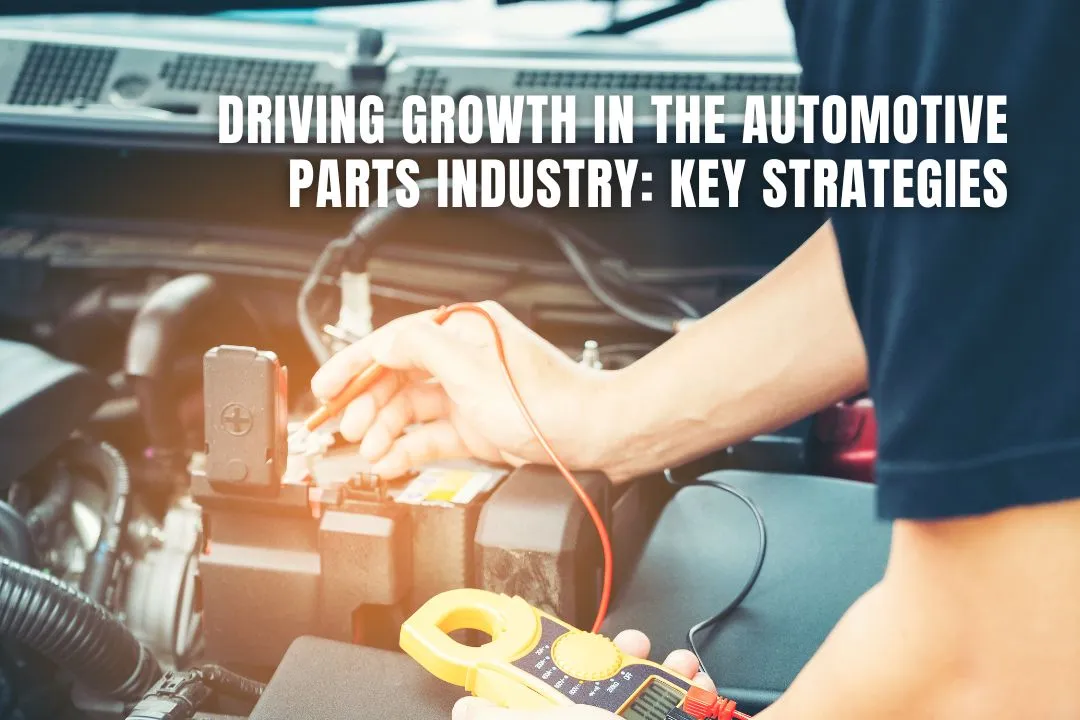Driving Growth in the Automotive Parts Industry: Key Strategies for Success
October 7, 2024

The automotive parts industry is experiencing rapid growth, but competition is fierce. As new technologies emerge and customer demands shift, businesses need to be flexible to stay ahead. Success now depends on a company's ability to adapt, innovate, and find ways to stand out.
This post will cover key strategies. They can help automotive parts firms grow and stay competitive. These approaches aim to help companies thrive in a fast-changing market. They include expanding product offerings and using e-commerce.
Key Takeaways on Driving Growth in the Automotive Parts Industry
- Expand Product Lines for Niche Markets: Focus on high-performance, eco-friendly, and aftermarket enhancements to cater to niche customer bases and foster loyalty.
- Tap Into Specialised Auto Parts Markets: Cater to restoration and customization enthusiasts by offering hard-to-find components and comprehensive restoration kits, enhancing brand reputation and loyalty.
- Build Strong Relationships with Suppliers: Develop partnerships with reliable suppliers for high-quality parts, competitive pricing, and insights into market trends to maintain a competitive edge.
- Focus on Great Customer Service: Enhance customer satisfaction through personalised service, proactive communication, and attentive listening to customer feedback.
- Improve Supply Chain and Inventory Management: Utilise modern technologies and analytics to optimise inventory levels, reduce costs, and ensure timely product delivery.
- Use E-Commerce to Reach More Customers: Leverage a strong online presence to market products, engage with customers, and tap into international markets for increased sales.
Register Your LLC
Company Registration
START NOWExpand Product Lines for Niche Markets
To grow in the automotive parts industry, companies should expand their products to serve niche markets. Focusing on niche needs, like high-performance or EV parts, can boost revenue and build customer loyalty. Eco-friendly options can help, too. By staying ahead of trends, businesses can better capture new markets.
In addition, the demand for aftermarket enhancements is rising. Many car enthusiasts will pay more for products that improve their cars' performance, reliability, and looks. By targeting this customer base, businesses can strengthen their market position and foster brand loyalty through repeat sales.
Tap Into Specialised Auto Parts Markets
Demand for specialised auto parts is rising. This is due to car restoration, customisation, and off-roading. Restoring classic cars or personalising vehicles is a popular hobby. Enthusiasts often seek authentic, hard-to-find items. This creates a lucrative opportunity for businesses to cater to these niche markets. Moreover, these customers are often highly knowledgeable and willing to invest in high-quality components.
For example, some companies specialise in offering comprehensive restoration kits for classic vehicles. One such product is the popular Jeep in a crate, which provides customers with everything they need to rebuild classic Jeeps from scratch. By offering full restoration solutions, businesses are helping car enthusiasts. They can now restore vehicles efficiently with premium components. This meets a demand. It also builds a strong reputation in the restoration community and boosts brand loyalty.
Build Strong Relationships with Suppliers
Strong partnerships with manufacturers and suppliers are critical for success in the market. Reliable suppliers ensure a steady flow of high-quality items. This is vital for meeting customer demand and keeping operations running smoothly. Strong supplier relationships can give businesses competitive pricing and exclusive deals. They may also provide early insights into new products.
Close work with manufacturers keeps businesses updated on trends, new tech, and materials for their products. This knowledge helps companies align their offerings with customer preferences and market trends. It gives them a competitive edge. By working with trusted suppliers, businesses can improve their products. This will strengthen their market position.
Focus on Great Customer Service
Excellent customer service is key to long-term success. Personalised service boosts repeat business. It builds trust and drives good word-of-mouth. In this industry, fast service is key. So is smooth order processing and clear, proactive communication. They all improve customer satisfaction and loyalty.
Listening to customers, especially those in niche markets, is vital. It helps companies refine their products and services to meet their needs. This is true for restoration enthusiasts and off-road vehicle owners. Surveys, social media, and feedback can reveal what customers want. This helps businesses stay ahead of the competition and build stronger client relationships.
Improve Supply Chain and Inventory Management
Efficient supply chain management is crucial in the automotive industry. By streamlining operations and using modern tech, companies can keep high-demand items in stock. They can also reduce excess inventory of slow-moving products. Effective supply chain strategies can lead to cost savings, faster order fulfilment, and an overall improved customer experience.
Using advanced inventory systems and predictive analytics helps businesses. They can make better decisions about restocking and forecasting demand. By tracking inventory in real-time and improving demand planning, companies can cut costs, prevent stockouts, and ensure timely delivery of components to customers. This approach enhances operational efficiency and improves profitability over the long term.
Use E-Commerce to Reach More Customers
E-commerce has significantly transformed the automotive parts industry, making it easier for businesses to reach a global audience. A strong online presence lets companies showcase their products. It also enables them to engage customers via digital marketing and drive sales through targeted ads. An online store lets businesses run promotions, showcase new products, and provide a smooth shopping experience.
Products like performance or restoration parts can benefit from strong SEO, content marketing, and social media. By using relevant keywords in product listings, companies can increase visibility. They can attract new customers by sharing fun content for auto fans and offering custom online experiences. E-commerce also opens doors to international markets, which can drive substantial growth.
Conclusion
The automotive parts industry offers many opportunities for growth. Businesses can stay competitive and grow by expanding their products, providing great customer service, and using technology to streamline operations. Companies that prioritise quality and customer relationships will succeed in this changing industry.

